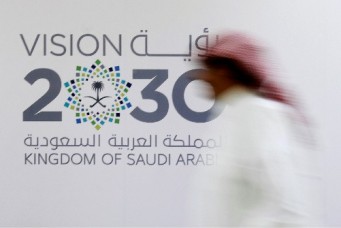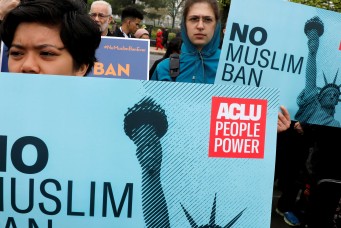The Kingdom Divided
The reality for most Saudis is far-removed from the Kingdom’s reputation for extravagance. Official unemployment stands at 10 percent, but unofficial estimates place it as high as 20 percent. The latest official figures reveal that 670,000 families—approximately 3 million out of a total population of 18 million—live in poverty. Nor is hardship restricted to rural areas: a recent documentary on poverty in Riyadh, Maloub Alayna (The Joke’s on Us) recorded testimonies of families living on one meal a day, with as many as twenty people living in the same home.

Saudi Arabia’s “day of rage” planned for last March failed to gain ground, and protests concentrated in the Eastern Province fell short of producing a national consensus around demands for political reform. The country’s domestic stability has been attributed to a combination of three factors: the regime’s ability to rely on an influx of oil reserves to buy-off political unrest, its domestic alliance with a conservative religious establishment and powerful tribal groups as a means of dividing and controlling sources of dissent, and the long-standing support of Western powers for external security. While in recent years growing economic challenges have weakened some of the regime’s most reliable pillars of stability and pockets of opposition inside the country have grown, the inability of such groups to mobilize collectively or otherwise offer a unified vision of reform has hindered the growth of serious challenges to the current order.
The reality for most Saudis is far-removed from the Kingdom’s reputation for extravagance. Official unemployment stands at 10 percent, but unofficial estimates place it as high as 20 percent. The latest official figures reveal that 670,000 families—approximately 3 million out of a total population of 18 million—live in poverty. Nor is hardship restricted to rural areas: a recent documentary on poverty in Riyadh, Maloub Alayna (The Joke’s on Us) recorded testimonies of families living on one meal a day, with as many as twenty people living in the same home.
Saudi Arabia’s position as the leading exporter of oil is threatened by unrestrained domestic fuel consumption, which grows at 7 percent annually. At this rate, the Kingdom is set to become a net oil importer within the next twenty-five years. Long-term plans to diversify the economy have made little impact: the government derives almost 75 percent of its revenue and 90 percent of export earnings from oil, and the country still has the lowest GDP per capita within the Gulf Cooperation Council—lower than Oman or Bahrain. Economic handouts to quell unrest—such as the $130 billion spending package announced last year to increase welfare benefits and construct 500,000 new housing units—are unsustainable and likely to lead to growing discontent over distribution of the country’s oil wealth.
Among the more successful of the regime’s strategies to maintain power is its historic alliance with the religious establishment. By co-opting the ultra-conservative Wahhabi base, the Al Saud have built a state fused around a single cultural and religious identity, to the exclusion of competing historic identities from the Hejaz and Eastern parts of the country. The benefits of this alliance to the regime are clear: as opposition activists began to mobilize in early 2011, the country’s Council of Senior Scholars issued a fatwa denouncing protests as “un-Islamic,” stating that “Islam strictly prohibits protests in the Kingdom because the ruler here rules by God’s will.” In addition, key ministerial and military positions have been delegated to a core of wealthy tribal families–institutionalizing powerful loyalties within the state and creating a strong elite with vested interests in the status quo.
These alliances, coupled with harsh punishments towards dissent, have thus far succeeded in suppressing the growth of liberal reformist movements. In November, sixteen men were given lengthy prison sentences after they attempted to set up a human rights organization. The founder of another organization, the Saudi Civil and Political Rights Association, was arrested last May, as were ten founding members of the Islamic Umma Party—which demanded greater representation and an end to absolute monarchy. During the past year, hundreds of citizens were also detained across the country under security-related charges. Moreover, a new anti-terrorism law is reportedly under discussion that will allow extended detention without charge under such broad definitions of terrorism as “endangering national unity” and “undermining the status of the Kingdom in the world.”
The most vocal constituency of those calling for reform are Shi‘a activists in the Eastern Province. Although home to 90 percent of the country’s oil reserves, the region is one of Saudi Arabia’s most impoverished, and its residents have long complained of sectarian discrimination. Shi‘a are excluded from both cabinet ministries and the armed forces, and educational textbooks routinely refer to them as apostates. Fatwas by senior clerics (such as the one issued in 1991 by former head of the Higher Council of Ulama Abdullah al-Jibrin) have even gone as far as sanctioning their killing. As recently as 2009, religious and community leaders in the region were arrested for participating in ‘Ashura religious ceremonies.
Institutionalized discrimination has fueled affinity with other Shi‘a abroad. Affinity to Bahrain’s community is strong as a result of a shared sense of victimization and historical connections between the two populations: both come from the Baharna ethnic group, speak the same dialect of Arabic, and historically belong to the extended region of Bahrain (once encompassing areas in southern Iraq and the eastern cities of al-Ahsa and Qatif). In recent years, Saudi Shi‘a have expressed these grievances through petitions, such as the 2003 “Partners in the Nation.”
The February 2011 protests in Bahrain provided the necessary spark to re-energize activists in the Eastern Province. Facebook pages like “AlQatif and AlHasa are with Bahrain’s noble revolution” and “AlQatif and Bahrain Are One People” attracted thousands and provided a platform to share photos of martyred protesters, revolutionary songs, and Bahraini activists’ speeches. Mimicking Bahrain’s protesters, chants of “no to humiliation” echo during Friday marches in cities such as Qatif, attracting hundreds of protesters. Security forces often swiftly descend on these protests, and activists have accused them of firing live ammunition. At least two demonstrators were killed last month as a result of shotgun wounds in addition to the two killed in January. The state officially denies responsibility for such deaths, claiming they were killed in “crossfire” with armed groups. Like the Bahraini government, the Saudi regime has depicted activists as backed by Iran and accused them of sedition.
While Shi‘a activists and liberal reformists have faced the brunt of the state’s crackdown, the government has also been careful to check the power of even its most loyal constituency. In mid-January, King Abdullah sacked the head of the moral police amidst growing complaints that that organization was growing too aggressive. This follows the sacking of a prominent cleric from the country’s Higher Council of Ulama in 2009 for denouncing the King’s decision to allow gender integration in a new science university. Wary of losing their privileged status, the country’s most conservative elements have also criticized the King for granting women the right to vote in municipal elections, accusing the regime of floundering to Western influence. Occasional public disagreements, however, have not disrupted the roots of the alliance which both sides recognize as critical to checking other potential sources of unrest, including that stemming from militant fundamentalists who question the ruling family’s claim to govern according to shari‘a.
While Saudi’s opposition remains deeply divided along sectarian (as well as tribal and ethnic) lines, the country faces a host of challenges that may provide the opportunity for the formation of cross-sectarian and cross-political alliances along a common set of demands, as demonstrated in 2003 when a group of liberals and Islamists from various sects signed a petition calling for democratic change. The deteriorating economic situation and growing unemployment are additional challenges atop questions regarding the line of succession, which does not define a process for passing power beyond the first generation of the Kingdom’s founders. Disputes within the second and third generation of the royal family—who have competing visions on the pace and direction of reform—might provide the opportunity for a reshuffle of alliances as new leaders seek to develop their own spaces of power. While sustained opposition movements continue to battle for their own Saudi Spring, their success hinges on their ability to unite around a common and national set of political demands—and lay to rest the demons of tribalism and sectarianism.
Elham Fakhro is a research associate for international law at the International Institute for Strategic Studies-Middle East.
This article is reprinted with permission from Sada. It can be accessed online at:http://carnegieendowment.org/2010/02/23/g20-in-2050-policy-consequences-of-long-term-growth-dynamics/a1e0, Carnegie Endowment for International Peace
Subscribe to Our Newsletter




